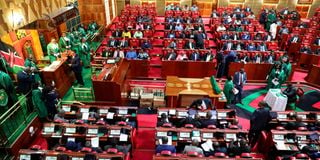Premium
MPs recommend inflating Ruto’s first budget by Sh81bn

The National Assembly's Budget and Appropriations Committee has recommended increasing President William Ruto’s maiden budget by Sh80.7 billion, a move that is likely to put an extra burden on taxpayers.
A committee of the National Assembly has recommended increasing President William Ruto’s maiden budget by Sh80.7 billion, a move that is likely to put an extra burden on taxpayers.
The proposal by the Budget and Appropriations Committee (BAC) means that Dr Ruto’s first budget will rise to Sh3.679 trillion, up from the Sh3.599 trillion estimate submitted to Parliament by the National Treasury in April.
It would also mean that the Kenya Kwanza administration’s maiden budget will be higher by Sh295.7 billion compared to former President Uhuru Kenyatta’s last budget of Sh3.384 trillion.
BAC, in its report to the full House, has proposed to increase the recurrent and development expenditures in the 2023/24 budget by Sh56.49 billion and Sh24.21 billion, respectively.
If approved the proposed changes could push the national government’s budget—excluding equitable revenue share to counties and public debt service payments—to Sh2.308 trillion, comprised of Sh1.565 trillion in recurrent expenditures and Sh743.15 billion in development expenditure. Counties will get Sh385.4 billion.
“The committee recommends that this House resolves that the net increase in the 2023/24 budget estimates of Sh80.7 billion be effected in the votes and programmes as shown in the first and second schedules as per the justifications provided,” said the committee in its report.
Debt repayments
The total budget—including debt redemptions for the fiscal year—will be Sh4.449 trillion, out of which nearly half will go towards the repayment of debts, highlighting the growing burden taxpayers shoulder to finance development projects through loans.
“The Sh4.449 trillion comprises of…Sh1.836 trillion in Consolidated Fund Services (CFS). Notably, the CFS expenditure amount includes Sh775.14 billion in interest payments on debt and Sh850.1 billion in principal debt redemption,” said BAC in its report.
The Executive will take the lion’s share of Sh2.16 trillion, of which Sh7.86 billion has been allocated to the Equalisation Fund, Sh2.8 billion to the Contingency Fund and Sh7.99 billion to the office of the Auditor-General.
Parliament has been allocated Sh41 billion while the Judiciary will receive Sh22.99 billion in the financial year starting July 1.

Budget and Appropriations Committee Chairperson Ndindi Nyoro at Hilton Garden Inn Hotel on February 13, 2023, during the Budget and Appropriations Committee meeting, to discuss the financial year 2022/23 supplementary budget estimates.
“The statutory CFS expenditure is set to increase by 13.6 per cent (Sh118.3 billion). The main drivers of the increase in CFS expenditures are Sh90 billion in interest payment on domestic debt, Sh16 billion expenditure on pension and Sh8.4 billion in interest payment on foreign debt,” the report states.
It adds: “Consequently, during the financial year 2023/24, the total expenditure on interest payment on domestic and foreign debt is expected to amount to Sh628.3 billion and Sh146.9 billion, respectively.”
MPs have added Sh520 million to President Ruto’s office, out of which Sh500 million is for operations and Sh20 million for the Betting Control and Licensing Board. The office of Prime Cabinet Secretary Musalia Mudavadi has been added Sh50 million.
Winners
Education has emerged as the biggest winner in the increase, with its allocation getting a Sh24.3 billion boost. This includes an additional Sh12.5 billion for the Higher Education Loans Board and Sh10.4 billion for junior secondary schools.
The lawmakers have added Sh1.42 billion to the Ministry of Interior, out of which Sh1.12 billion will be spent on general administration and support services while Sh300 million will be added to the National Authority for the Campaign Against Alcohol and Drug Abuse.
The National Irrigation Authority has been apportioned an extra Sh2.2 billion, an additional Sh1.73 billion has been allocated for water and sewerage infrastructure development, and Sh1.2 billion for marine stock assessment.
Lawmakers have also added Sh1.7 billion to the Ministry of Defence, out of which Sh500 million will be used for recruitment, which has not been done for the last two years, and Sh1.2 billion for recurrent spending.
They have also allocated an extra Sh3 billion for the completion of 181 stalled markets across the country, Sh1 billion for the public service internship programme, Sh2.4 billion for integrated regional development and Sh4.64 billion for investment development and promotion.
The MPs have further added Sh3.14 billion for road transport, Sh1.1 billion for power transmission and distribution, and Sh3 billion for the Equalisation Fund.
BAC said that CFS expenditure accounts for 41.3 per cent of the total budget and will continue to exert fiscal pressure during budget implementation.
“Further, the depreciation of the Kenya shilling is worsening the debt situation due to high expenditure on debt servicing,” the report notes.
Official data show Kenya’s public debt hit Sh9.4 trillion as at the end of March this year with the debt-to-GDP ratio standing at 64.7 per cent.
BAC has also questioned the ambitious revenue collection target of Sh2.571 trillion, which represents a 17 per cent increase relative to the expected 2022/23 collections. The committee said the revenue target for the 2023/24 financial year is quite ambitious, taking into account that historically, ordinary revenue has grown at an average of 10 per cent.
The budget increase comes at a time when the Finance Bill, 2023 is facing fierce opposition, amid concerns that the new tax measures proposed in the Bill will make life unbearable for Kenyans who are heaving under the high cost of living.
The Bill proposes to introduce a new statutory deduction into the National Housing Development Fund at 3 per cent of gross earnings, which is expected to further eat into employees’ take-home pay.
It further proposes that VAT on petroleum products be applied at 16 per cent from the current rate of 8 per cent. This is expected to have a profound effect on the cost of petroleum products in the country and would likely push up the prices above the current historical highs.
The Bill has also proposed to net more from high-income earners by introducing a new pay-as-you-earn tax band at a 35 per cent for persons whose gross monthly income is above Sh500,000.






